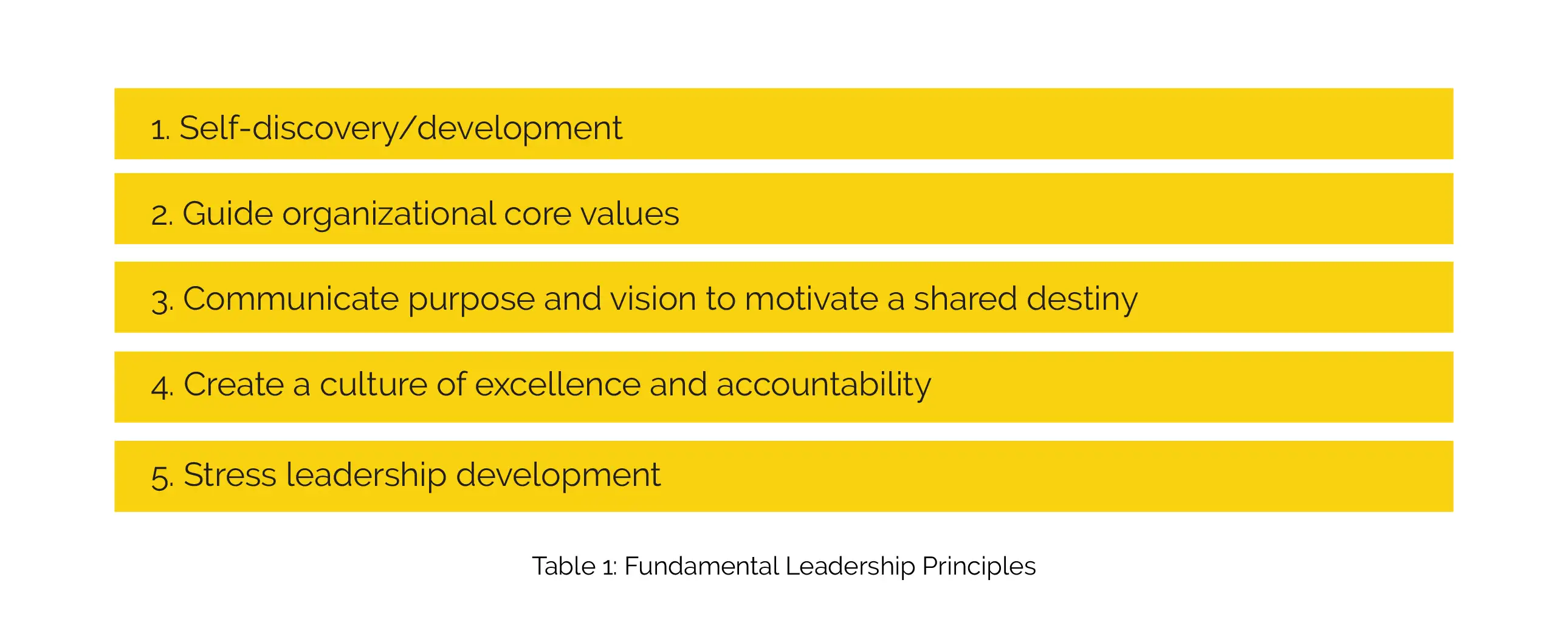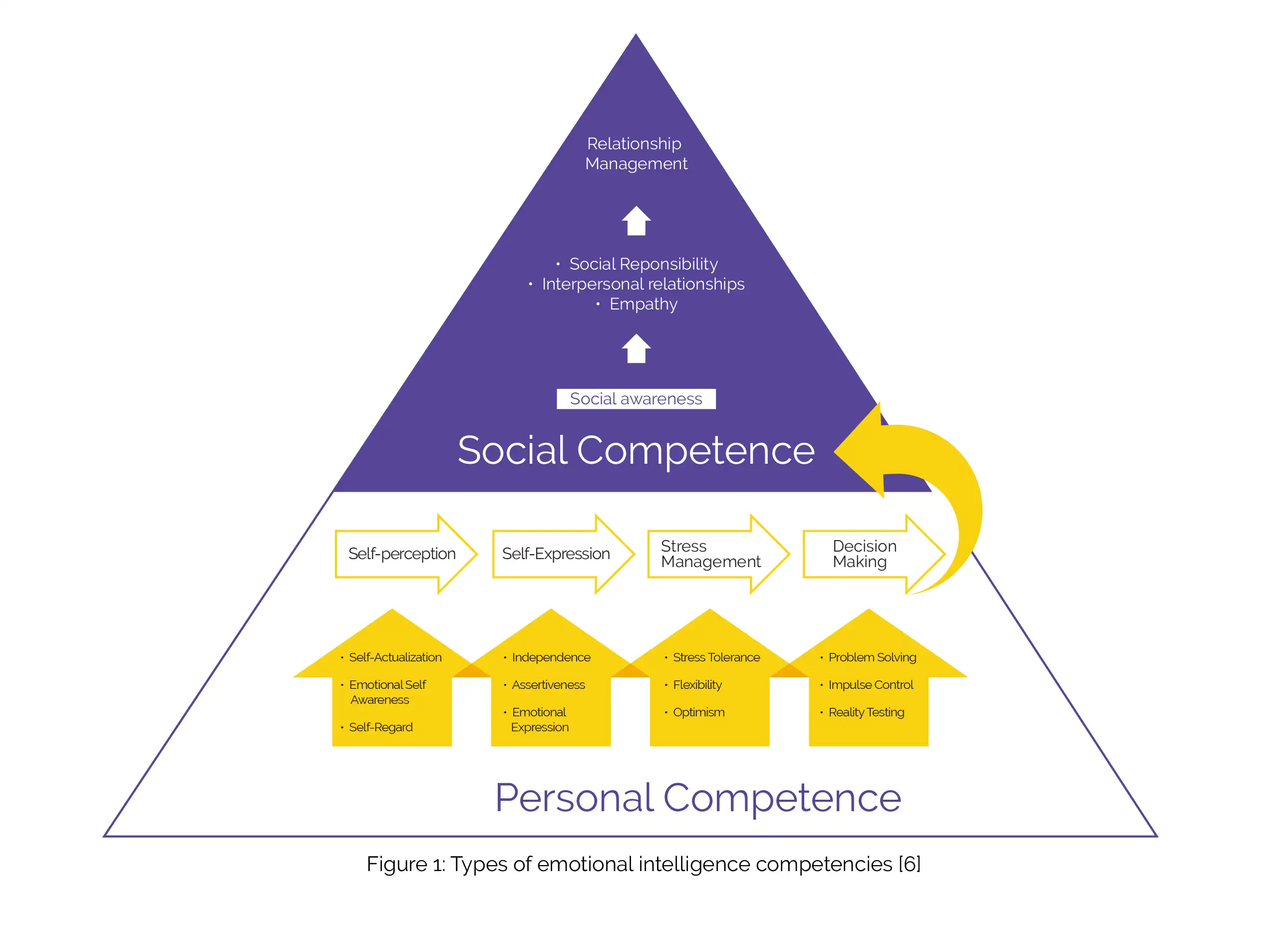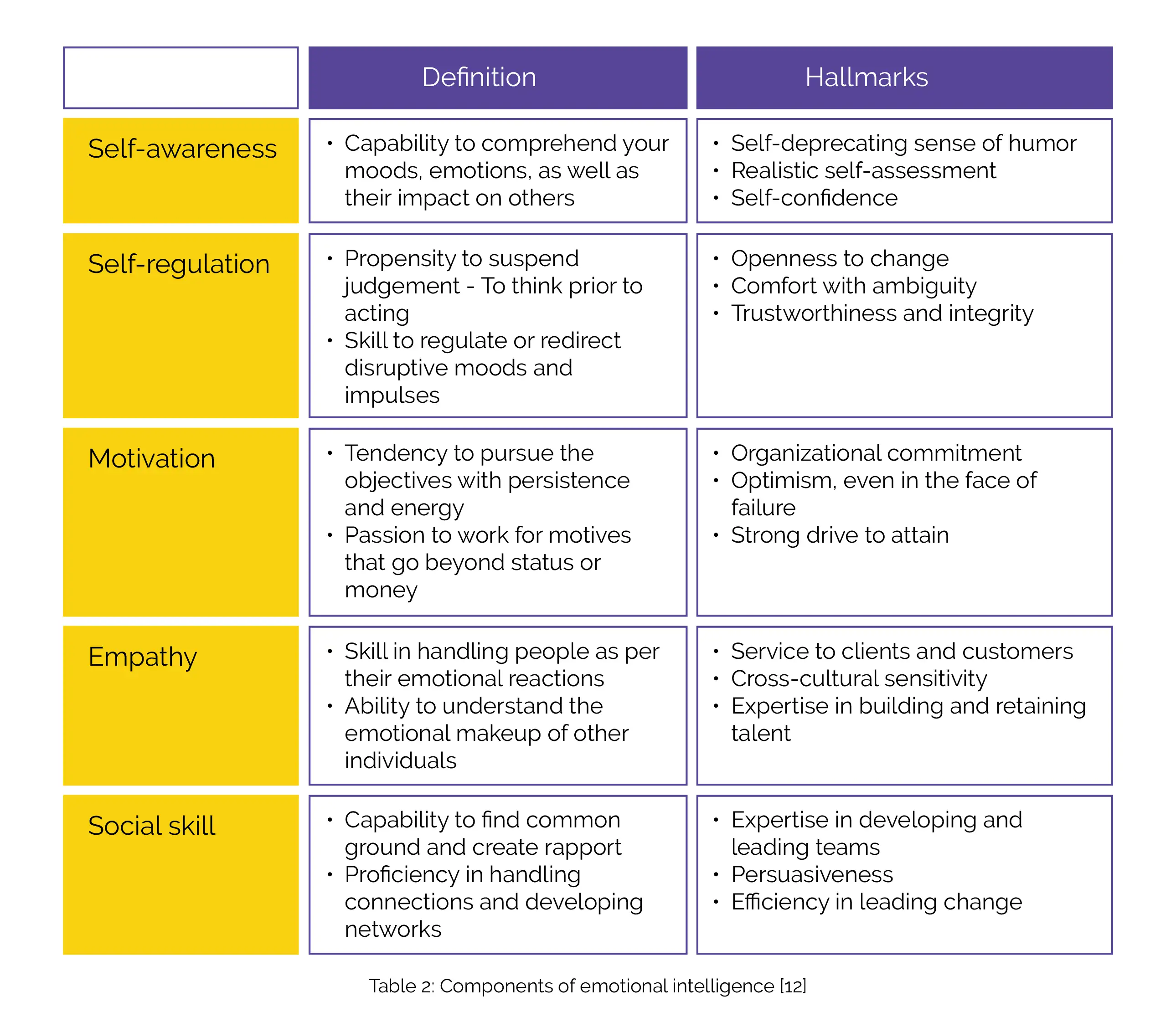Categories
Change Password!
Reset Password!


Are you the kind of leader who thrives under pressure, can sense the emotions of your team even when they aren't expressed, and/or puts self-care first to prevent burnout? If "yes", then you are showing signs of high emotional intelligence. [1] Stress, pace, and complexity of today’s world are taking a toll on leaders – as evidenced by the growing number of unexpected departures owing to inadequate ethical decisions, physical health problems, and emotional and mental burnout.
A fundamental part of a physician's practice encompasses being a leader, particularly given the urgent necessity for qualified leaders to promote and steer patient-centered and organizational outcomes. [2] Knowing how to use emotional intelligence can enhance relationships with your patients and interactions with your colleagues. [3] With the rising emphasis on medical subspecialization and novel initiatives in the medical care field, more physician leaders will be required. [2]
For delivering patient care (both clinically sound and emotionally sensitive) by doctors, medical education attempts to equip doctors with a wide spectrum of skills. The need to define and rate the fundamental elements of professional competence has grown in order to enhance and streamline this endeavor. Six core competencies have been defined: (1) Patient Care; (2) Professionalism; (3) Systems-based Practice; (4) Interpersonal and Communication Skills; (5) Medical Knowledge, and (6) Practice-based Learning and Improvement.
Each core competency can be quantified and related to performance and clinical indicators of outcome.
To foster educational strategies that will encourage these competencies' growth and enhance patient care, it is necessary to comprehend the underlying characteristics of these competencies. A broad spectrum of skills that contribute towards these core competencies is believed to be supported by emotional intelligence. [4]
The term "emotional intelligence" refers to the set of abilities, talents, and competencies that affect one's ability to succeed in the face of demands, challenges, and environmental pressures. [5] It has completely revolutionized management and transformed leadership, introducing the idea that being aware of one's emotions is essential for combating stress. [3] Also referred to as Emotional Quotient (EQ), it is a fundamental building step for healthcare providers' success, in particular, to handle the complexities inherent in the modern healthcare system. [6]
A wide array of healthcare obstacles stem from working in highly complicated and emotionally demanding surroundings. In order to be successful, the capability to handle yourself and your relationships with other people is an indispensable skill that physicians and other leaders in the healthcare industry should possess. [7] An effective leader comprehends the importance of emotional intelligence, nonverbal and verbal communication, preparation, and mindset on team performance. [8]
Those with high emotional intelligence control their emotions to respond to situations flexibly and in a way that is consistent with their objectives, thus increasing their survival chances. [5] Emotional intelligence has been deemed a crucial leadership competency and is extensively recommended as a way of developing physician leadership. [9,10] It is made up of personal-emotional-social components of general intelligence and exhibits an array of non-cognitive (social and emotional) abilities, competencies, and skills that affect one’s ability to succeed in combating environmental pressures and demands. According to research, 67% of the skills required by successful leaders fall into the realm of emotional intelligence. [11]
This article offers insights into defining physician leadership through emotional intelligence, an indispensable healthcare leadership competency. [10]

Effective Physician Leadership and Its Benefits
Physicians are placed in leadership positions by the medical team, community, and society, specifically during times of crisis like the COVID-19 outbreak. Two-thirds of resident physicians who participated in a 2015 poll agreed that a formalized leadership programme would improve their ability to supervise and treat patients. Despite the fact that all doctors are perceived as leaders, the notion of leadership is rarely, if ever, portrayed or developed as a significant part of medical training. [12]
Every day, doctors engaged in leadership roles supervise treatment teams (such as advanced practise practitioners or medical students), direct patient cardiac and pulmonary resuscitations, and promote efficient communication among patients, families, and other consulting doctors. [2] It is vital for doctors to keep the momentum of teams moving positively forward. [13] Beyond situations involving direct patient care, a skillful medical leader may influence patient care indirectly by fostering better team leadership, communication, and morale. [2]
Physicians are expected to manage and motivate their teams, whether they are teachers, administrators, researchers, or clinicians. According to the recommendation of a report by Institute of Medicine, academic health centres should develop leaders at all levels who can handle the system and organizational modifications necessary to enhance health via innovation in education, research, and patient care. It has been demonstrated that hospitals with better-rated boards of directors and management practices provide higher-quality treatment and better clinical outcomes, encompassing decreased mortality.
For a leader to build a successful team, engagement and interprofessional teamwork are pivotal abilities. Improved management techniques have also been linked to greater financial results and elevated patient approval ratings. The well-being of doctors is also impacted by effective leadership, with stronger leadership being linked to lower physician burnout and better satisfaction. [12] According to research, 50% of medical students, residents, and practising doctors report experiencing burnout. In order to specifically prevent burnout, leadership training can be beneficial at the individual and institutional levels. [14]
According to the findings of a recent study, for each one-point rise in composite leadership score, there was a 9.0% rise in the likelihood of satisfaction and a 3.3% reduction in the likelihood of burnout among the physicians supervised. Leadership philosophies enhance healthcare quality indicators. The best leadership practices foster a sense of teamwork, engagement, and mentoring within the workforce. Staff involvement is a consistent element, despite the fact that leadership approaches might differ. A leader with an authoritative approach exhorts the team to join them in attaining the goal by saying, "Come with me."
A leader with an affiliative style fosters harmony and forges emotional ties in an environment where "people come first." Democratic leaders elicit input from their employees to reach an agreement by posing the question, "What do you think?" Finally, a manager who employs a coaching approach aids personnel in recognizing their strengths and areas for development. These managerial practices contrast with the ineffective coercive leader who wants instant conformity, that is,“Do what I tell you.” The 5 fundamental leadership principles are illustrated in Table 1:

Good leaders practice good communication and listening, concentrate on results, co-create support systems, have an open (growth) mentality (the belief that one’s abilities are not innate but can be improved via effort and learning), pay unwavering attention to inclusion; equity; and diversity, and establish connections and trust. [12]
What Exactly is Emotional Intelligence?
“By teaching people to tune into their emotions with intelligence and expand their circles of caring, we can transform organizations from the inside out and make a positive difference in our world.” — Daniel Goleman
All efficient leaders are united by one critical feature—a raised level of emotional intelligence development. [15] In today's increasingly complex healthcare system, physicians must possess high levels of emotional intelligence and leadership qualities in order to prioritize tasks and effectively communicate with a wide range of stakeholders. [16] Clinical organization physicians serve as managers of knowledge-based organizations, developing and putting into practice solutions to challenging issues in dynamic environments.
Sometimes, the physician leader encounters the overwhelming task of making the best choice possible to attain or advance the clinical entity's mission. Numerous internal and external factors affect how well healthcare organizations can speculate, assess, and implement quality decisions. The recognition and management of human variables, like emotion, are indispensable in the attempt for improving judgements quality and decision-making processes within the clinical industry, even though extrinsic variables may be more challenging to handle. [17]
Across providers and settings, emotional intelligence is widely endorsed as a leadership evolution approach. Since there are different models of emotional intelligence and leadership development techniques, it is important to understand that emotional intelligence is applicable in both medical education and practise. [10] The term “emotional intelligence” has been linked with the idea of self-development before striving to improve others. [18] It is a leadership attribute that deals with the capacity to comprehend and control your own emotions as well as your interactions with others. [12]
Emotional intelligence of medical care personnel has been found to be positively associated with self-esteem, and more particularly, the mood is a strong predictor of it. [5] The doctor, who serves as the team's leader, must set an example for employees and patients to follow while responding to an adverse event. In a survey, senior managers in the corporate world ranked the characteristics of the best leaders. The study's psychologists interviewed the best leaders to examine their skills utilizing objective metrics like profitability. The findings indicated that emotional intelligence was twice as important as technical skills and intelligence quotient (IQ), despite the fact that intellects and cognitive abilities were also crucial.
For instance, in a 1996 research, top managers who had an ideal level of emotional intelligence experienced a 20% increase in their division's annual earnings beyond estimates. [12] For leading a thriving workforce, emotional literacy is crucial. Contrary to IQ, which measures intellect through standardized tests, emotional intelligence is something that anyone can acquire and develop at any moment. In reality, raising one's emotional intelligence must be a constant professional and personal objective, particularly for leaders. Notably, 80–90% of the skills that set high performers apart from underperformers fall under the category of emotional intelligence. [1]
Emotional Intelligence Competencies
The organizational culture is significantly influenced by the leader's emotional intelligence abilities. Healthcare executives that possess emotional intelligence skills are better able to comprehend, involve, and inspire their staff. These skills are necessary for adequately handling conflict and making practical solutions to challenging issues. [11] There are two types of emotional intelligence competencies:
1. Personal competence: It implies how you feel about yourself (your relationship with yourself). Strong personal competence allows a person to calmly control their emotions and to have the self-awareness to navigate their emotions in a healthy way.
2. Social competence: It implies how you interact with others (your relationship with others). Through social awareness and relationship management, people with high social competence manage interpersonal interactions with empathy (Figure 1). [1]

Outstanding leaders exhibit both of these! [1] Personal competence is the foundation upon which social competence—that incorporates social awareness and management of relationships—is built. [11] Social competence enables leaders to foster the success of individuals, teams, and organizations without risking their own well-being. On the other hand, personal competence boosts emotional resilience. [1]
Components of Emotional Intelligence
Despite a keen analytical mind, professional training, and a variety of creative personal qualities, emotional intelligence is indeed an indispensable condition for competent leadership. A leader's level of emotional intelligence growth is portrayed by a combination of 5 vital skills. These 5 skills enable leaders to attain the most fruitful work not only from themselves, but also from their subordinates as well. [15] Below are five building blocks of emotional intelligence (Table 2):

1. Self-awareness: It is the ability to understand your frailty, strengths, drives, emotions, and objectives. This can be helped by keeping a journal of your everyday thoughts and by just pausing to pay attention when your emotions are at their highest. [7,12] Great leaders concentrate on building their strengths and curtailing their weaknesses. For instance, a doctor who excels as a general surgeon might benefit the medical group by concentrating on surgery and working to establish a center of excellence in that area of specialization. [18]
Ways to be a self-aware leader: Be an example of optimism. But, avoid being prey to toxic positivity. Do not be reluctant to acknowledge and rectify your errors. [1]
2. Self-regulation or Self-management: It demonstrates control, i.e., acting in accordance with your moral principles and remaining at peace under pressure. [12] In this, one understands own emotions and does not let emotions regulate his/her actions. Great leaders are aware that there is a slight space between the response and the stimulus. Your ability to manage your emotions in this situation will help you concentrate on the task at hand and also enable you to clearly see situations. [18]
Ways to be a balanced leader: Establish healthy boundaries that don't require excessive effort. Invest in a set of leisurely pursuits that will serve as a source of internal resources you may draw on when trouble arises. [1]
3. Motivation: Having a purpose, or knowing your "why," motivates you and keeps you optimistic.[12]
Ways to be a motivational leader: Motivate others to use effective strategies for recognition rather than pursuing monetary rewards. Be liberal with your praise as well. Being praised by corporate leadership is valuable to team members. [1]
4. Empathy: The capacity to comprehend another person's feelings, needs, desires, and perspectives is demonstrated by empathy. [7,12]
Ways to be a more empathetic leader: Communicate with new people. Try to pay attention. For doing splendid work and procuring incredible results, you must have incredible relationships. [1]
5. Social skill: It is the skill to make links that are mutually beneficial. It encompasses handling relationships and settling disputes for moving people in the appropriate direction. [7,12]
Ways to be a socially-skilled leader: Pick your words carefully. Words have the ability to either increase or crumble trust. Also, observe team members' nonverbal signs for any problems. [1]
How to Identify Leaders with High Emotional Intelligence
Leaders who are trying to develop their emotional intelligence can do so by surrounding themselves with emotionally intelligent people. Since a successful workplace depends on being able to comprehend and relate to others in a way that fosters operational synergy, it is likely that the higher the EQ of your team, the more organizational successes you will experience as a whole. According to a study, while IQ is only accountable for 20% of a person's overall effectiveness, emotional intelligence is accountable for 58% of their performance. Leaders having high emotional intelligence display the following qualities:
Benefits of High Emotional Intelligence in Health Care
In today's fast-paced world of medical care, physicians need effective tools to get ahead in their careers.
Embracing emotional intelligence has become a crucial feature of contemporary cults. [19] It enhances your capacity to control your emotions, encourage and inspire employees, and forge closer bonds with coworkers. [13] When leaders employ emotional intelligence for guiding their actions and thinking, they can take control of the situation instead of allowing emotions to overtake their sensibilities. [1]
Furthermore, it aids you to create relationships, boost job satisfaction, minimize team stress, and defuse conflict. A high emotional intelligence means having tremendous potential to raise the retention of staff and the productivity of the team. [20]
The benefits of high emotional intelligence are listed below:
Establishing a non-judgmental, safe, and supportive learning environment for emotional intelligence culture has a good influence on patient relationships, staff retention/recruitment/morale, medical teamwork, medical quality, medical safety, and innovation while fostering dedication. [6]
Taking into consideration the above advantages, it is not surprising that companies are actively attempting to use artificial intelligence for boosting emotional intelligence. [12] Organizations that use emotional intelligence can make significant and long-lasting gains by strengthening the connections and interactions between patients, medical staff, and administration. [7]
Drawbacks of Low Emotional Intelligence
The lack of emotional intelligence is a common source of failure as a leader. The soft skills necessary for effective leadership have historically received little attention in medical schools and residency programs. As a result, doctors could find it cumbersome to be triumphant in leadership positions. These soft skills are pivotal whether you are directing an executive board meeting, supervising employees in a clinic, or managing a team in the operating room.
Being overly defensive, handling disagreements poorly, and having trouble connecting with your team are all common signs of low emotional intelligence. [7] Leaders having low emotional intelligence are passive, critical, and reluctant to change. Such leaders may contribute to poor internal alignment, a decline in staff engagement, and a loss in productivity. Leaders with high EQ are characterized by their zeal, tolerance, constancy, decisiveness, and warmth.
According to a study, employees are 400% less likely to quit their job if they work for a leader who has a high EQ. [1] Inadequate application of emotional intelligence culture adversely harms the organization’s reputation, escalates staff turnover, and also impacts patient care. [6] Fostering emotional intelligence among leaders can be a game-changer for managing turnover in organizations with retention issues. [1]
Developing Your Emotional Intelligence
Physicians are usually viewed as the “emotional thermostat” of their team, which means that keeping your emotions in check (and recognizing the emotional cues of others) is extremely crucial. Learn about your habits and triggers, your capacity for emotional self-control, your ability to handle challenging situations, and the degree to which you can relate to patients and coworkers. Your ability to manage your emotions could make you a better doctor than you now are. [21]
(1) Build your emotional intelligence using multi-rater feedback
360-degree feedback, a common development method that aids in recognizing strengths and flaws, is another essential tool for boosting emotional intelligence. Although there are numerous types of 360-tools, the capacity to compare the evaluation of your performance with that of others is crucial for emotional intelligence development. Simply fill out a self-evaluation survey and ask a family member or trusted colleague who is familiar with you to do the same. You can learn substantially about your blind spots and areas for development on both a professional and personal level by examining how your views compare to those of others.
(2) Use mindfulness as a route to emotional intelligence
Your emotional intelligence can get better with continued practice. Learn to pause. Reflect on how you are feeling, particularly in difficult or distressing scenarios. It is a pivotal first step in creating your emotional intelligence. This gives you space to observe and comprehend your emotional reactions. You can begin to comprehend the motivations behind your behavior by simply acknowledging your sentiments.
Through this activity, one can become more self-aware and ultimately have more freedom to select the optimal course of action rather than relying solely on impulse. Over time, you become aware of your triggers and develop the skills to manage them. By engaging in mindfulness and meditation practices, you can enhance your capacity to control both yourself and other people's emotions.
(3) Get coaching for emotional intelligence
For enhancing several aspects of emotional intelligence and leadership skills, one-on-one coaching is a popular strategy. You can develop your potential by working with a qualified and experienced coach to assist you get essential insights. A wide array of progressive organizations value acknowledge the importance of investing in the emotional intelligence of their leaders and encourage the utilization of internal or external coaching to boost productivity. [7]
To access your emotional intelligence and maintain your resilience while implementing change, use the following strategies:
Take Away!
Our emotions significantly drive our behaviors, and our behaviors ascertain whether we fail or succeed professionally. Transforming the medical care system into one that better serves the requirements of patients and colleagues needs more than just creating revolutionary care delivery models. It also calls for fostering enduring bonds and fruitful interactions among doctors, patients, and administrators of health care. With this realization, healthcare professionals can apply emotional intelligence principles to initiatives for enhancing organizational culture. [7]
Doctors are thrust into leadership positions as soon as their formal medical education is completed. The secret to being a good leader is using emotional intelligence for mentoring the team and fostering a sense of belonging and value among the staff. [12] Emotional intelligence is the illustration of good leadership skills - leaders who are in control of themselves are empathetic, self-motivated, and exhibit excellent social skills. [3] While emotional intelligence skills are not innate, they can be inculcated by the willingness to have personal growth and the desire for self-improvement. [6]
It correlates with a whole range of core competencies that modern medical curricula aim to impart. [4] Better clinical outcomes, higher levels of professional satisfaction, more empathy, and better teamwork are all displayed by physician leaders who have high levels of emotional intelligence, notably in how they control their own emotions and respond to those of others. Physician leaders who possess high emotional intelligence exhibit stronger influence, bring about productive change, and develop into the kind of leaders that people want to follow. [7]
The standardization and applicability of emotional intelligence assessment in healthcare providers should receive more attention. More consideration should be given to the specific components of emotional intelligence, the best time to concentrate on them during the training period, and how improving these competencies may affect physicians' career trajectories. Additionally, research on long-term outcomes of emotional intelligence training on family physician, patient, and hospital systems are warranted. [16]
References
1.Why Emotional Intelligence Matters for Healthcare Leaders. Available from: https://wambi.org/blog/why-emotional-intelligence-matters-for-healthcare-leaders/
[Last accessed on: 23 May 2023]
2. Yau AA, Cortez P, Auguste BL. The Physician Leader: Teaching Leadership in Medicine. Adv Chronic Kidney Dis. 2022 Nov;29(6):539-545.
3. Do You Have the Emotional Intelligence to Successfully Lead in the New Year?. Available from:
https://www.gbscorporate.com/blog/do-you-have-the-emotional-intelligence-to-successfully-lead-in-the-new-year [Last accessed on: 25 May 2023]
4. Arora S, Ashrafian H, Davis R, Athanasiou T, Darzi A, Sevdalis N. Emotional intelligence in medicine: a systematic review through the context of the ACGME competencies. Medical education. 2010 Aug;44(8):749-64.
5. Molero Jurado MDM, Pérez-Fuentes MDC, Martos Martínez Á, Gázquez Linares JJ. Emotional intelligence and self-esteem: Personal competencies necessary for physicians. Front Med (Lausanne). 2022 Jul 27;9:965417.
6. Ubaidi A. Is emotional intelligence a need skill for health care provider. Journal of Family Medicine and Disease Prevention. 2018;4(1).
7. Emotional Intelligence for Physician Leaders. Available from: https://postgraduateeducation.hms.harvard.edu/trends-medicine/emotional-intelligence-physician-leaders [Last accessed on: 22 May 2023]
8. Sutton K, Retzky J, Bedi A, Provencher CMT, Mulcahey MK. Leadership in Orthopaedic Surgery: Creating a Highly Effective Leader. Instructional Course Lectures. 2023;72:29-37.
9. Nowacki AS, Barss C, Spencer SM, Christensen T, Fralicx R, Stoller JK. Emotional intelligence and physician leadership potential: a longitudinal study supporting a link. The Journal of Health Administration Education. 2016;33(1):23.
10. Mintz LJ, Stoller JK. A systematic review of physician leadership and emotional intelligence. Journal of Graduate Medical Education. 2014 Mar;6(1):21-31.
11. Fernandez CS, Peterson HB, Holmstrőm SW, Connolly A. Developing emotional intelligence for healthcare leaders. Emotional intelligence–New perspectives and applications. InTech. 2012 Feb 1:239-60.
12. Mark P. Trolice. The Physician as Leader. Available from: https://www.medscape.com/viewarticle/990393 [Last accessed on: 22 May 2023]
13. Your Emotional Intelligence Determines Your Team’s Success. Available from: https://www.deborahmunhoz.com/blog/emotional-intelligence/
[Last accessed on: 24 May 2023]
14. Ghossoub Z, Nadler R, El-Aswad N. Targeting Physician Burnout Through Emotional Intelligence, Self-Care Techniques, and Leadership Skills Training: A Qualitative Study. Mayo Clinic Proceedings: Innovations, Quality & Outcomes. 2018 Feb 22;2(1):78-79.
15. Reshetnikov VA, Tvorogova ND, Hersonskiy II, Sokolov NA, Petrunin AD, Drobyshev DA. Leadership and emotional intelligence: current trends in public health professionals training. Frontiers in Public Health. 2020 Jan 31;7:413.
16. Ha SJ, Patlolla SR, Wojda TR. Emotional Intelligence and Leadership Development: Implications for Family Medicine Residency Programs. Medical Education for the 21st Century. 2021.
17. Hess J, Miller B. Emotional Intelligence, Physician Leadership and Decision-Making within the Clinical Organization. Oklahoma State Medical Proceedings. 2017 Oct 16;1(1).
18. Tuso PJ. The Physician as Leader. The Permanente Journal. 2003 Winter;7(1):68–71.
19. The Emotionally Intelligent Physician Leader. Available from: https://www.physicianleaders.org/publications/books/emotionally-intelligent-physician-leader-childs?v=41923493036212 [Last accessed on: 22 May 2023]
20. Why emotional intelligence makes you more successful. Available from: https://www.latrobe.edu.au/nest/why-emotional-intelligence-makes-you-more-successful/#:~:text=Emotional%20intelligence%20is%20the%20ability,conflict%20and%20improve%20job%20satisfaction [Last accessed on: 25 May 2023]
21. Emotional intelligence: Why doctors need to develop this skill. Available from: https://www.mdlinx.com/article/emotional-intelligence-why-doctors-need-to-develop-this-skill/dQHuxsoFAvYS0QBBPXBA0 [Last accessed on: 24 May 2023]
Comments (0)